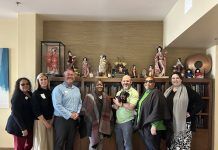I loved my childhood. My dad worked hard and had two jobs while my mom stayed home with my sister and me. We had a nice house and a middle-class lifestyle. I never even thought about poverty and struggle.
But when my parents divorced, I suddenly had a very intimate relationship with poverty. My mom hadn’t been to college and couldn’t replace my dad’s wages. Meanwhile, I began to struggle in high school and was diagnosed with paranoid schizophrenia.
We got by because we had Medicaid, housing vouchers, and food stamps. And with my diagnosis, I’ve been able to receive Social Security Disability Insurance. But now that I’m an adult, I want to live independently, and SSDI isn’t anywhere near enough.
Eventually, I was able to earn my bachelor’s degree. But due to the serious nature of my disability, my employment options are limited. And complicating matters, if I start to earn “too much” — even if it’s not actually enough to make ends meet — I’ll lose my benefits and end up poorer than I was before.
No matter what I do, it seems I’m stuck — since my parents’ divorce when I was a child, I’ve been in “the system.” As much of a blessing as the aid is, it can depend a lot on the whims of whoever’s in power to make decisions about funding and eligi¬bility for life-saving assistance.
Right now, for example, Rep. Glenn Thompson (R-PA) — chair of the House Agriculture Committee, which has jurisdiction over food programs — has a plan to cut $30 billion from SNAP.
When I hear plans like this to defund assistance programs even more, I feel hopeless. I wish these lawmakers understood how hard people like me work to do the right thing, to get ahead, to give back — and how many obstacles their decisions put in our way.
The social safety net needs to be more, not less, responsive to our situations. The more our leaders restrict and defund programs, the more we are stigmatized, stymied, and made hungry, homeless, and sick. More restrictions keep us in precarious situations and keep us from thriving.
I’ve had more obstacles to overcome than many. Now I want to be able to help others, to be married and have children, to give back as a social worker. But that path seems unreachable as long as my financial situation — and the threat of losing the other support I need if I earn just a little money — makes my independence impossible.
So, I volunteer. I tell my story so lawmakers and community members can hear and understand.
Here’s what I want our leaders to know: We live and die by the mistakes they make. Please prioritize the health and well-being of our nation’s families who just want to have the same opportunities to thrive as those who’ve been fortunate enough to escape many of the challenges that life has hurled at us.
Don’t require us to be destitute without hope before we can access the assistance we need. Help us to get to the point where we can be truly independent — then we can help others get there too.
At some time or another, most of us in life need some help. When lawmakers realize that, the nation will be stronger.
Brazil Jefferson is a volunteer with RESULTS from Victorville, California. This op-ed was distributed by OtherWords.org














